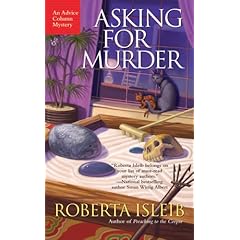Roberta Isleib: The Psychological Nancy Drew
Roberta Isleib is guest blogging today while on a tour for her third advice column mystery, ASKING FOR MURDER (Berkley.) Roberta is a clinical psychologist, the Agatha, Anthony, and Macavity nominated author of eight mysteries, and the president of Sister in Crime.
The Psychological Nancy Drew
Thanks for hosting me Lee-and for giving me a chance to talk about my favorite pet peeve: how shrinks are trashed in movies, TV shows, and books. Here’s an example from the movie TIN CUP:
“Meet Dr. Griswold,” golfer Roy McAvoy says to his friends. “This is Molly. She’s my shrink.”
“Ex-shrink,” Dr. Molly Griswold corrects him. “We’re sleeping together now so I can’t be his therapist.”
Dizzy, uptight but sexy, with boundaries like cheesecloth-this was the kind of model I found for a fictional psychologist when I began to write my first golf mystery, Six Strokes Under. And sports psychologists didn’t have the market cornered when it came to looking ridiculous. Shrinks of all varieties have been portrayed in the popular media as bumbling fools, lacking in scruples, or crazy themselves.
From the very beginning, I wanted to use my training in clinical psychology by including reasonable psychologists in my novels. The challenge was to dream up characters who could use the principles of psychology to help solve mysteries without imploding with self-importance, stumbling over personal issues, or crossing ethical boundaries. I wanted to do it right.
Dr. Rebecca Butterman, the protagonist in my advice column mysteries, works with her patients in a way similar to what I did. Only she’s a lot braver (or more foolish) than I would ever be-causing her to nose into mysteries where I’d never go. (I’d call Lee or one of his cohorts without setting one toe on the trail of a murderer.)
One of the main characters in ASKING FOR MURDER is a sandplay therapist, which I discovered I knew next to nothing about as I began to write her. So I found a sandplay expert who talked me through the whole process-I know the book’s richer for her input. I’m begging all you writers-if you’re going to include a mental health professional in your opus, do your research.
Here are a few examples of books, movies and TV shows that I think have done a good job showing my profession:
THE SOPRANOS: I overlooked a lot of fearsome violence to watch Lorraine Bracco’s depiction of Tony Soprano’s psychiatrist, Dr. Jennifer Malfi. My God, wasn’t he the patient from hell? He tested every boundary and she held the line. In longer-term, insight-oriented therapy, the idea is to take what happens between the therapist and the patient and look at it as a microcosm of what life is probably like outside therapy. So when Tony pressed gifts on Dr. Malfi, she wisely and bravely interpreted the underlying meaning of his gestures. Of course you could question the wisdom of conducting psychotherapy with a sociopath, but that was part of the story.
STEPHEN WHITE’S ALAN GREGORY MYSTERY/THRILLER SERIES: Stephen White was also a clinical psychologist before he started writing and his main character has a private practice in Boulder, Colorado. His descriptions of the process of psychotherapy and the dilemmas shrinks face such as maintaining confidentiality, conflicts of interest, and privileged information are right on the money. Other psychology-focused series I really like are GH Ephron’s Peter Zak mysteries featuring a forensic neuropsychologist and Denise Swanson’s Scumble River series featuring a school psychologist.
ORDINARY PEOPLE (1980) based on the novel by Judith Guest, directed by Robert Redford, the shrink played by Judd Hirsch-one of my all-time favorite movies. Hirsch plays a warm, funny, insightful therapist who brings a depressed, guilty teenager back to life. Okay, so the grand revelation is not anything I’ve ever seen or experienced in therapy, but I loved it anyway. I also adored the scene where Donald Sutherland goes in to see the therapist and begins to realize some painful truths about his marriage.
IN TREATMENT (HBO): There’s a lot of buzz about this and I finally had the chance to watch an episode on a transatlantic flight. This was week 3, when Laura arrives late with a story about trying to save a dog who’d been hit by a car. Okay, I was sucked in fast, and it looked a lot like real psychotherapy. But remember that the therapist is supposed to use things that happen in the therapy as grist for the mill-this is called transference. He isn’t supposed to tell the patient “I think it’s time to quit.” I’m going to watch more, but if you pinned me to the mat, I’d say I don’t care for this guy…
And now the doctor is in-ready to take your questions and comments about favorite shrinks, bad shrinks, your shrinks (oh wait, better not go there…)
And please visit http://www.robertaisleib.com to learn more about the advice column mysteries.

For tin Cup:
http://www.youtube.com/watch?v=b55nTZ3imRI
Asking for Murder:
http://www.youtube.com/watch?v=vdYZMWzdxy4
The Sopranos:
http://www.hbo.com/sopranos/cast/character/dr_melfi.shtml
Stephen white:
http://www.authorstephenwhite.com/
Ordinary People:
http://www.imdb.com/title/tt0081283/
In treatment:





My first introduction to “shrinks” in novels came from Erica Jong, and it jaded me a little. Eventually, I read Running with Scissors, a memoir starring the craziest of head doctors. So I see your point, and I’ll try to remember it’s all made up … even some of the memoirs.
Hi Jan, thanks for your questions. Yes, your psychiatrist could both prescribe medication if it’s needed and conduct psychotherapy.
If you have a good story, I think the market would be receptive to the characters you’re describing. These sound more in the camp of thriller or harder-boiled novels, which are very much in demand right now.
So keep writing and good luck!
Hi, Roberta. Thanks for bringing up psychologists in relation to mysteries. I am writing novels that have a child psychiatrist who is more therapist than ‘doctor’ relying on drug treatment. I figured if I made her a psych, she could do both. True?
Topics she’s addressing are grief due to parents of a young woman dying in a train accident as well as post partum depression in the first book. The second one in progress is about a patient who is a recovering anorexic who is accused of murder. The doctor pairs up with a detective who does the police investigating while she does the ‘human nature’ support and hand-holding of the characters in distress.
Are you aware of agents or markets where such stories might get a hearing?
Cheers,
Jan in Melbourne
Weren’t they awful? what a pair!
Roberta,
I can never think of shrinks unless Dr. Fraiser Crane comes to mind. Well, and Lilith.
Sorry I’m late, couldn’t figure out how to register:)
Hi Joyce, looking forward to Working Stiffs! What about Bob was hysterical but also terribly painful from a therapist’s pov!
Elena, thanks for your comments. Of course I know there ARE nutty shrinks out there, but not ALL of us are nutty:). And there are nutty doctors, plumbers, dentists…ask me about that story one day.
The Psychological Nancy Drew–I simply thought that summed up my character…a psychologist solving crimes using clues another kind of detective wouldn’t notice. I was a big ND fan too Hallie! thanks for stopping by…
LOVE to new book, Roberta —
BUT having said that… I so love this description:
Dizzy, uptight but sexy, with boundaries like cheesecloth
and I confess, I wanted to read a book in which she’s the villain.
And I completely “get” “The Psychological Nancy Drew” — but then I’m a big ND fan. She was what she was, and we loved loved loved her.
– Hallie
http://www.hallieephron.com
The thing is Roberta, all of them are really out there. Having spent a good bit of time on both sides of the “desk”, I recognized every shrink you mentioned and then some.
Love your “cheesecloth boundaries” I know several. One of the favorites in my collection are the “situational ethics” dudes especially in the area of confidentiality or lack thereof.
But, I do have a question – why “The Psychological Nancy Drew”? It doesn’t strike me as a compliment.
Hi Roberta, nice to “see” you here!
Although not exactly a “good shrink” I really liked Richard Dreyfuss’ character in “What About Bob?”. And Bill Murray was just too funny in that movie.
Then there’s always Bob Newhart.
I’m looking forward to your guest blog on Working Stiffs on the 22nd.